Mises, Ludwig von. Human Action: A Treatise on Economics
Подождите немного. Документ загружается.

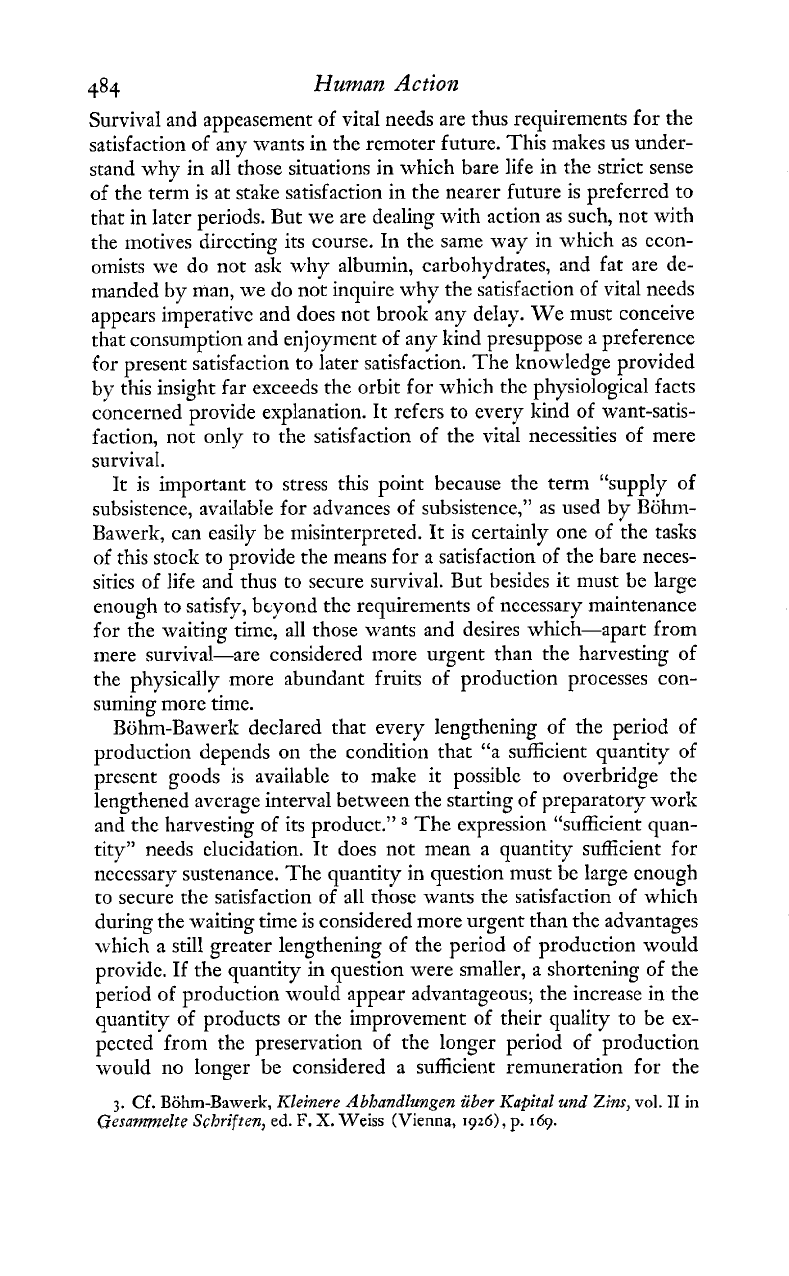
484
Human
Action
Survival and appeasement of vital needs are thus requirements for the
satisfaction of any wants
in
the remoter future. This makes us under-
stand why in all those situations in which bare life in the strict sense
of the term is at stake satisfaction in the nearer future is preferred to
that in later periods. But we are dealing with action as such, not with
the motives directing its course. In the same way in which
as
econ-
omists we do not ask why albumin, carbohydrates, and fat are de-
manded by man, we do not inquire why the satisfaction of vital needs
appears imperative and does not brook any delay. We must conceive
that consumption and enjoyment of any kind presuppose a preference
for present satisfaction to later satisfaction. The ltnowledge provided
by this insight far exceeds the orbit for which the physiological facts
concerned provide explanation. It refers to every kind of want-satis-
faction, not only to the satisfaction of the vital necessities of mere
survival.
It is important to stress this point because the term "supply of
subsistence, availabIe for advances of subsistence," as used by Bijhm-
Bawerk, can easily be misinterpreted. It is certainly one of the tasks
of this stock to provide the means for a satisfaction of the bare neces-
sities of life and thus to secure survival. But besides it must be large
enough to satisfy, btyond the requirements of necessary maintenance
for the waiting time, all those wants and desires which-apart from
mere survival-are considered more urgent than the harvesting of
the physically more abundant fruits of production processes con-
suming more time.
Biihm-Bawerk declared that every lengthening of the period of
production depends on the condition that "a sufficient quantity of
present goods is available to make it possible to overbridge the
lengthened average interval between the starting of preparatory work
and the harvesting of its product." The expression "sufficient quan-
tity" needs elucidation. It does not mean a quantity sufficient for
necessary sustenance. The quantity in question must be large enough
to secure the sarisfacrion of aii rhose wants rhe satisfacrion of which
during the waiting time is considered more urgent than the advantages
which
a
still greater lengthening of the period of production would
provide. If the quantity in question were smaller, a shortening of the
period of production would appear advantageous; the increase in the
quantity of products or the improvement of their quality to be ex-
pected-from the preservation of the longer period of production
would no longer be considered a sufficient remuneration for the
3.
Cf.
Bohm-Bawerk,
Kleinere Abhandlungen iiber Kapital und Zins,
vol.
I1
in
Qesamelte Schriften,
ed.
F.
X.
Weiss
(Vienna,
1926),
P.
1%.
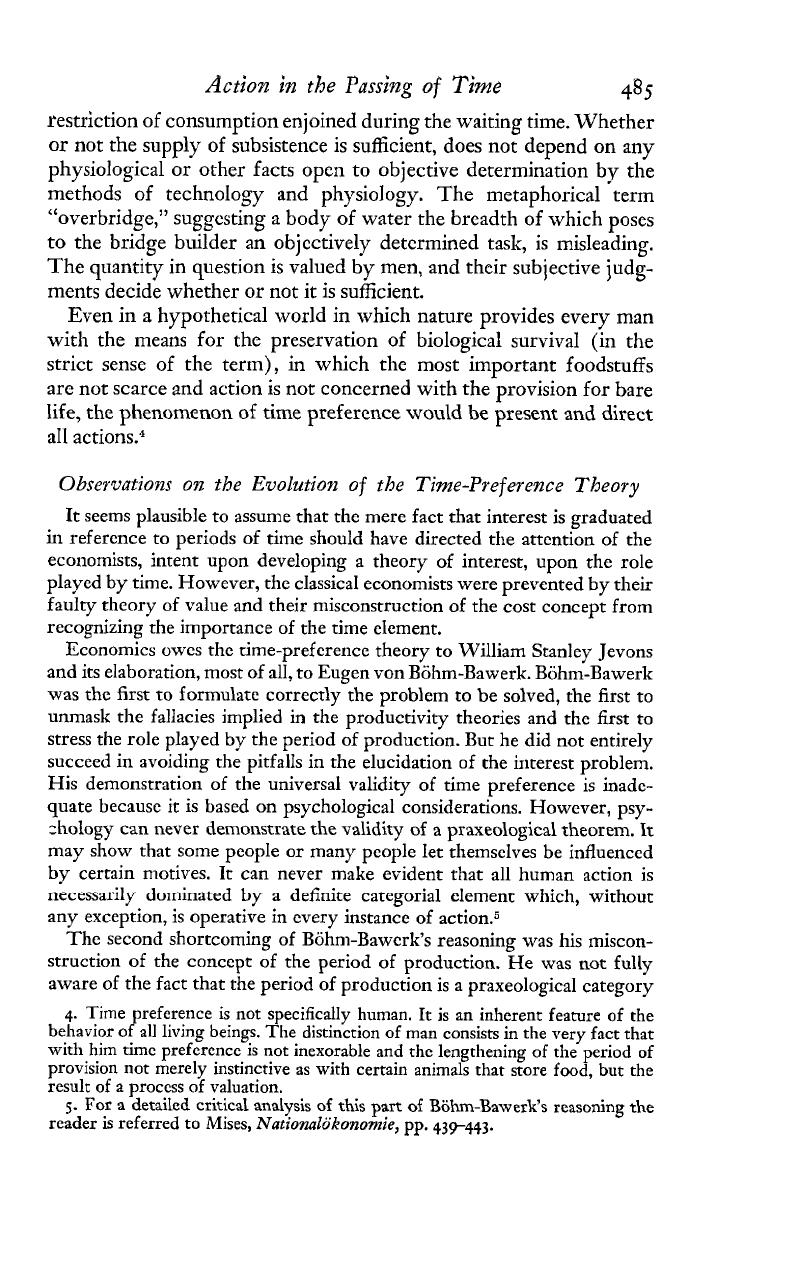
Action
in
the Passing of
Time
485
restriction of consumption enjoined during the waiting time. Whether
or not the supply of subsistence is sufficient, does not depend on any
physiological or other facts opcn to objective determination
by
the
methods of technology and physiology. The metaphorical term
"overbridge," suggesting a body of water the breadth of which poses
to the bridge builder an objectively determined task, is misleading.
The quantity in question is valued by men, and their subjective judg-
ments decide whether or not it is sufficient.
Even in
a
hypothetical world in which nature provides every man
with the means for the preservation of biological survival (in the
strict sense of the term), in which the most important foodstuffs
arc not scarce and action is not concerned with the provision for bare
life,
the
phenomenon of time preference
would
be present and
direct
a11 acti0ns.l
Observations on the Evolution of the Time-Preference Theory
It seems plausible to assume that the mere fact that interest is graduated
in reference to periods of time should have directed the attention of the
economists, intent upon developing a theory of interest, upon the role
played by time. However, the classical economists were prevented by their
faulty theory of value and their niisconstruction of the cost concept from
recognizing the importance of the time element.
Economics owes the time-preference theory to William Stanley Jevons
and its elaboration, most of all, to Eugen von Bohm-Bawerk. Biihnl-Bawerk
was the first to formulate correctly the problem to be solved, the first to
unmask the fallacies implied in the productivity theories and the first to
stress the role played by the period of production. But he did not entirely
succeed in avoiding the pitfalIs in the elucidation of the interest problem.
His demonstration of the universal validity of time preference is inade-
quate because it is based on psychological considerations. However, psy-
zhology
can
never demonstrate the validity
of
a praxeological theorem. It
may show that some people or many people let themselves be influenced
by certain motives. It can never make evident that all human action is
necessarily dominated
by
a definite catcgorial clement which, without
any exception, is operative in every instance of a~tion.~
The second shortcoming of Bohm-Bawerk's reasoning was his miscon-
struction of the concept of the period of production. He was
not
fully
aware of the fact that the period of production is a praxeological category
4.
Time preference is not specifically human. It is an inherent feature of the
behavior of all living beings. The distinction of man consists in the very fact that
with him time preference is not inexorable and the lengthening of the period
of
provision not merely instinctive as with certain animals that store food, but the
result of
a
process
of
valuation.
5.
For
a
detailed critical analysis of this
part
of
Bohm-Bawerk's reasoning the
reader is referred to Mises,
Nationalokonomie,
pp.
439-443.
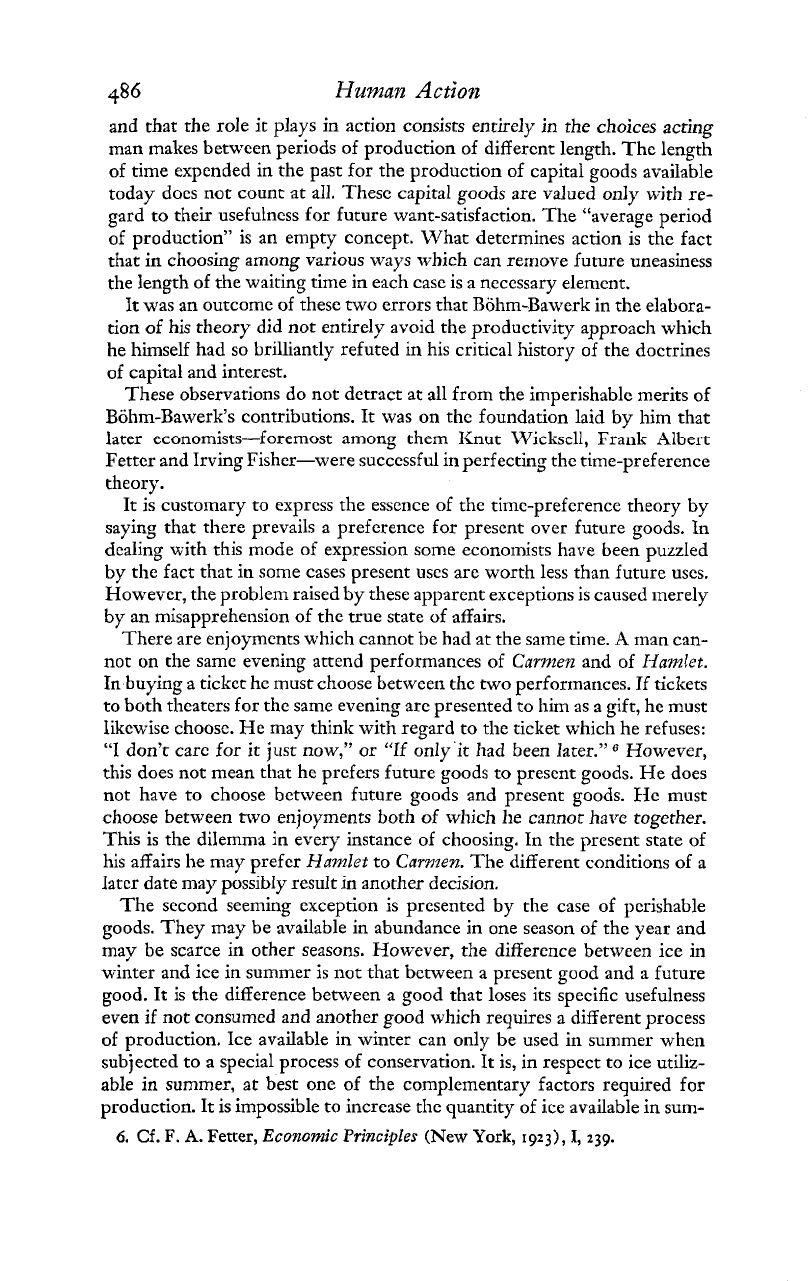
Human
Action
and that the role it plays in action consists entirely in the choices acting
man makes between periods of production of different length. The length
of time expended in the past for the production of capital goods available
today does not count at all. These capital goods are valued only with re-
gard to their usefulness for future want-satisfaction. The "average period
of production" is an empty concept. What determines action is the fact
that in choosing among various ways which can remove future uneasiness
the length of the waiting time in each case is a necessary element.
It was an outcome of these two errors that Bohm-Bawerk in the elabora-
tion of his theory did not entirely avoid the productivity approach which
he himself had so brilliantly refuted in his critical history of the doctrines
of capital and interest.
These observations do not detract at all from the imperishable merits of
Bohm-Bawerk's contributions. It was on the foundation laid by him that
later economists-foremost among them Knut Wicksell, Frank Albert
Fetter and Irving Fisher-were successful in perfecting the time-preference
theory.
It is customary to express the essence of the time-preference theory by
saying that there prevails a preference for present over future goods. In
dealing with this mode of expression some economists have been pu~zled
by the fact that in some cases present uses are worth less than future uses.
However, the problem raised by these apparent exceptions is caused merely
by an misapprehension of the true state of affairs.
There are enjoyments which cannot be had at the same time.
A
man can-
not on the same evening attend performances of
Carmen
and of
liamlet.
In buying a ticket he must choose between the two performances.
If
tickets
to both theaters for the same evening are presented to hi~n as a gift, he must
likewise choose. He may think with regard to the ticket which he refuses:
"1
don't care for it just now," or "If only it had been later." However,
this does not mean that he prefers future goods to present goods. He does
not have to choose between future goods and present goods. He must
choose between two enjoyments both of which he cannot
have
together.
This is the dilemma in every instance of choosing. In the present state of
his affairs he may prefer
Hamlet
to
Carmen.
The different conditions of a
later date may possibly result in another decision.
The second seeming exception is presented by the case of pcrishable
goods. They may be available in abundance in one season of the year and
may be scarce in other seasons. However, the difference between ice in
winter and ice in summer is not that between a present good and a future
good. It is the difference between a good that loses its specific usefulness
even if not consumed and another good which requires a different process
of production. Ice available in winter can only be used in summer when
subjected to a special process of conservation. It is, in respect to ice utiliz-
able in summer, at best one of the complementary factors required for
production. It is impossible to increase the quantity of ice available in sum-
6.
Cf.
F.
A.
Fetter,
Economic Principles
(New
York,
rgzj),
I,
239.
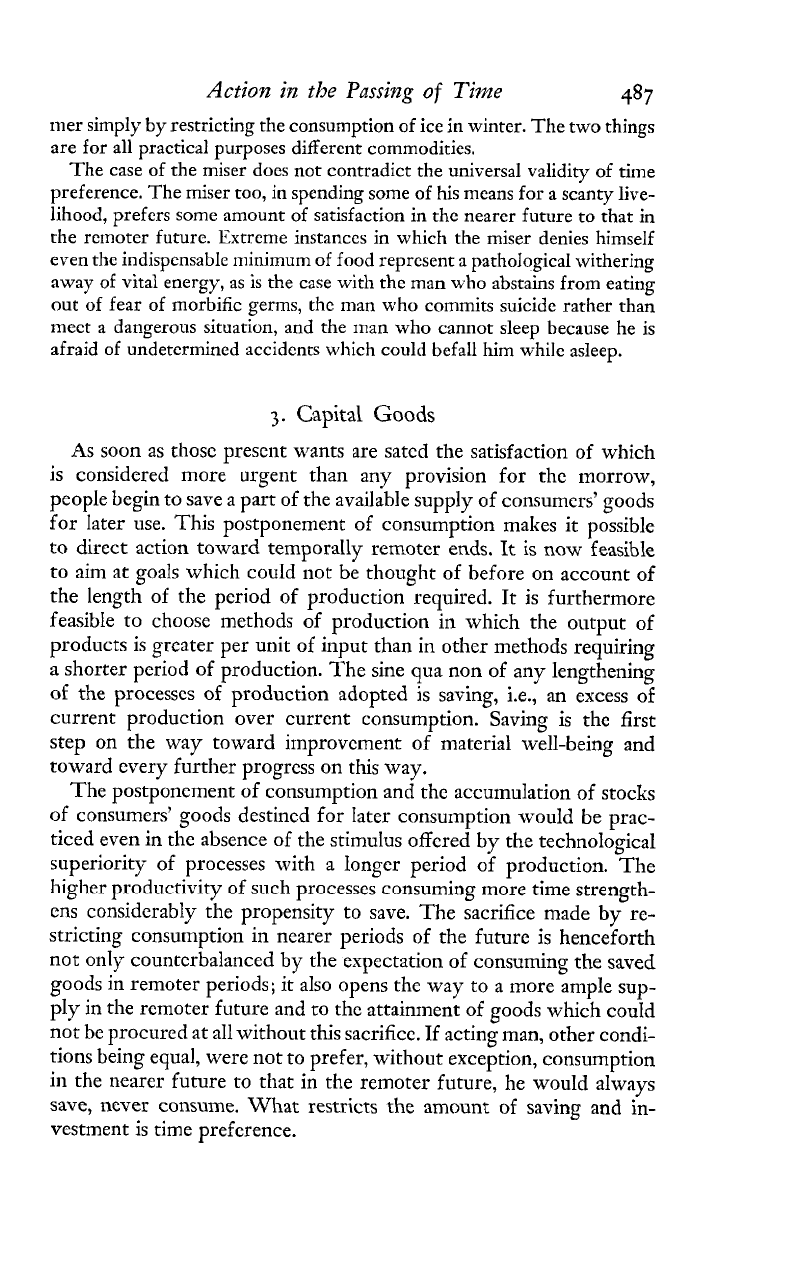
Action in
the
Passing
of
Time
487
mer simply by restricting the consumption of ice in winter. The two things
are for all practical purposes different commodities.
The case of the miser does not contradict the universal validity of time
preference. The miser too, in spending some of his means for a scanty live-
lihood, prefers some amount of satisfaction
in
the nearer future to that in
the remoter future. Extreme instances in which the miser denies himself
even the indispensable minimum of food represent a pathological withering
away of vital energy, as is the case with the man who abstains from eating
out of fear of morbific germs,
the
man who commits suicide rather than
mect a dangerous situation, and the man who cannot sleep because he is
afraid
of
undetcrmined accide~ts which could befall him w-hile asleep.
3.
Capital
Goods
As soon as those present wants are sated the satisfaction of which
is considered more urgent than any provision for the morrow,
people begin to save a part of the available supply of consumers' goods
for later use. This postponement of consumption makes it possible
to direct action toward temporally remoter ends.
It
is now feasible
to aim at goals which could not be thought of before on account of
the length of the period of production required. It is furthermore
fea5ibIe to choose methods of production in which the output of
products is greater per unit of input than in other methods requiring
a shorter period
of
production. The sine qua non of any lengthening
of the processes
of
production adopted is saving, i.e., an excess of
current production over current consumption. Saving is the first
step on the way toward irnprovement of material well-being and
toward every further progress on this way.
The postponement of consumption and the accumulation of stocks
of consumers' goods destined for later consumption would be prac-
ticed even in the absence of the stimulus offered by the technological
superiority of processes with a longer period of production. The
higher productivity of such processes consuming more time strength-
ens considerably the propensity to save. The sacrifice made
by
re-
stricting
consumption
in nearer periods of the future is henceforth
not only counrcrbalanced by the expectation of consuming the saved
goods in remoter periods; it also opens the way to a more ample sup-
ply in the remoter future and to the attainment of goods which could
nit be procured at all without this sacrifice. If acting man, other condi-
tions being equal, were not to prefer, w-ithout exception, consumption
in the nearer future to that in the remoter future, he would always
save, ncver consume. What restricts the amount of saving and in-
vestment is time preference.
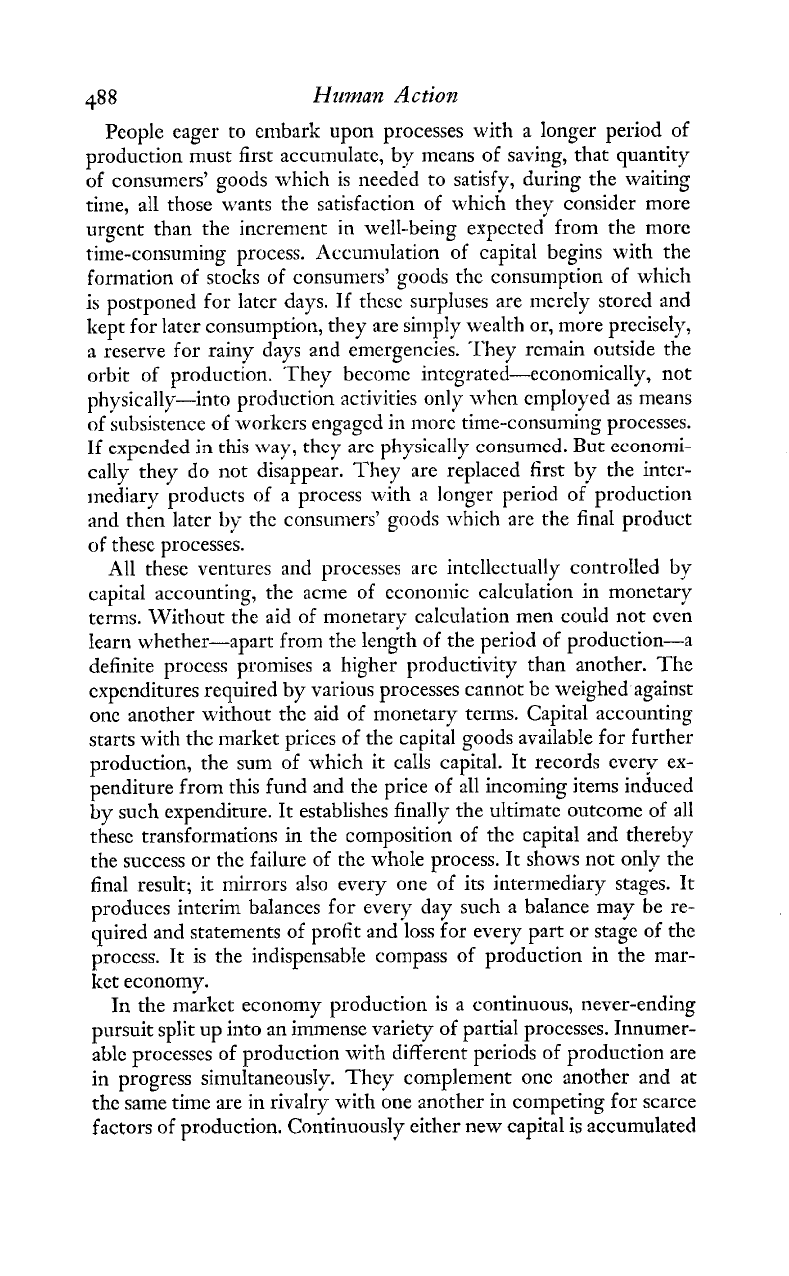
488
Human
Action
People eager to cmbark upon processes with a longer period of
production must first accumulate, by means of saving, that quantity
of
consumers'
goods which is needed to satisfy, during the waitink
time, all those wants the satisfaction of which they considcr more
urgcnt than thc increment in well-being expccted from the more
time-consuming process. Accun~ulation of capital begins with the
formation of stocks of consumers' goods thc consumption of which
is postponed for latcr days. If thesc surpluses are rnerely stored and
kept for latcr consumption, they are simply wealth or, more precisely,
a reserve for rainy days and emergencies. 'lhey remain outside the
orbit of production. They become integrated-economically, not
physically-into production activities only when crnployed as means
of subsistence of workcrs engagcd in more time-consuming processes.
If expended in this way, they are physically consumed. But economi-
cally they do not disappear. They are replaced first by the intcr-
~nediary products of a process with a longer period oi production
and then latcr
by
the consumers' goods which arc the final product
of
these processes.
All these ventures and processes arc intcllcctually controlled by
capital accounting, the acme of cconornic calculation in monetary
terms. Without the aid of monetary calculation men could not cvcn
Iearn whether-apart from the length of the period of production-a
definite proccss pron~ises a higher productivity than another. The
cxpcnditures required by various processes cannot be weighed against
one another without the aid of monetary terms. Capital accounting
starts with thc market prices of the capital goods availabIe for further
production, the sun1 of which it calls capital. It records cvcry ex-
penditure from this fund and the price of all incoming items induced
by such expenditure. It establishcs finally the uItimatc outcome of all
these transformations in the composition of the capital and thereby
the success or the failure of thc whole process. It shows not only the
final result; it mirrors also every one of its intermediary stages.
It
produces intcrinl balances for e;ery day such a balance hay he re-
quired and statements of profit and loss for every part or stage of the
proccss. It is the indispcnsabIe compass of production in the mar-
ket economy.
In the market economy production is a continuous, never-ending
pursuit split up into an immense variety of partiaI proccsscs. Innumer-
able proccsscs of production with different periods of production are
in progress sitnultaneously. Thcy cornplenlent one another and at
the same time are in rivalry with one another in competing for scarce
factors of production. Continuously either new capital is accumulated
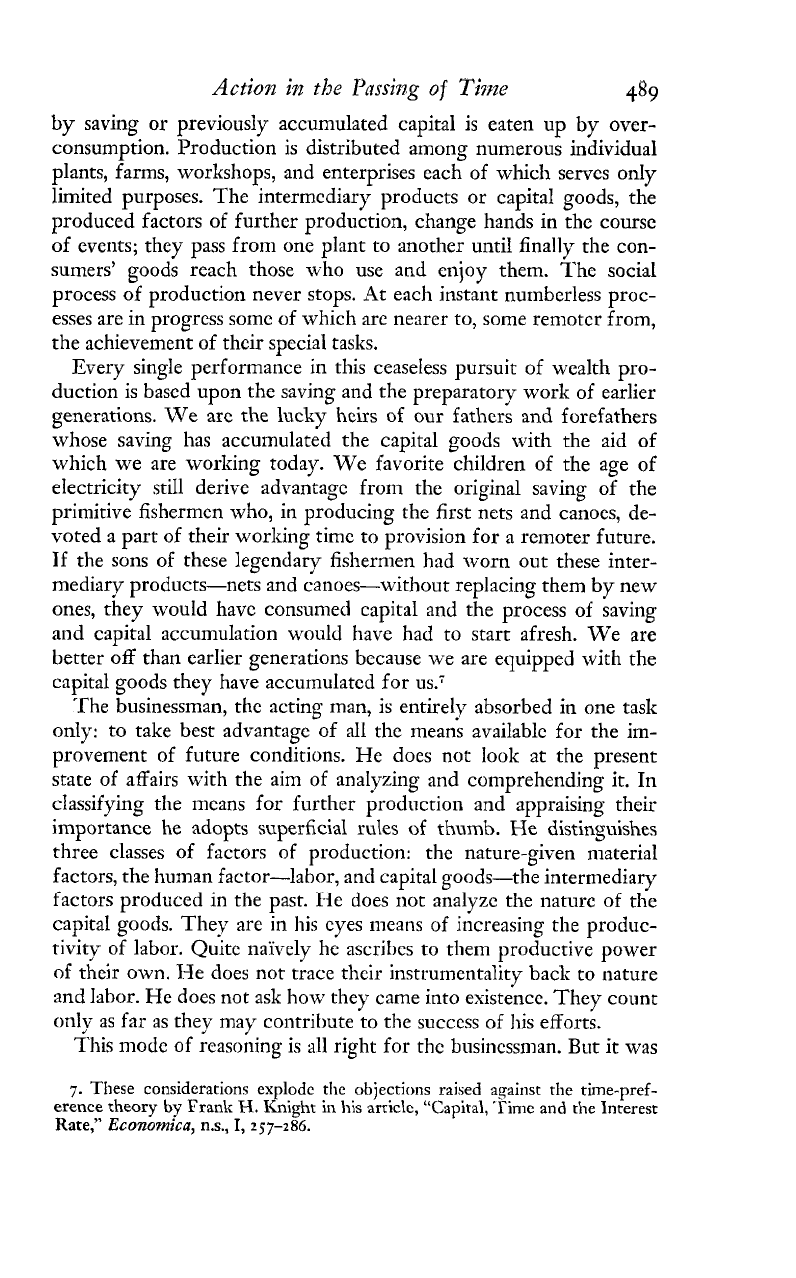
Action
in
the
I'nssing
of
Time
489
by saving or previously accumulated capital is eaten up by over-
consumption. production is distributed among numerous individual
plants, farms, workshops, and enterprises each of which serves only
limited purposes. The intermediary products or capital goods, the
produced factors of further production, change hands in the course
of evcnts; they pass from one plant to another until finally the con-
sumers' goods reach those who use and enjoy them. The social
process of ~roduction never stops. At each instant numberless proc-
esses are in progress some of which arc nearer to, some remoter from,
the achievement of their special tasks.
Every single performance in this ceaseIess pursuit of wealth pro-
duction is based upon the saving and the preparatory work of earlier
generations.
We
are the lucky heirs of our fathers and forefathers
whose saving has accumulated the capital goods with the aid of
which we are working today. We favorite children of the age of
electricity stiIl derive advantagc from the original saving of the
primitive fishermen who, in producing the first nets and canoes, de-
voted a part of their working time to provision for a remoter future.
If
the sons of these legendary fishermen had worn out these inter-
mediary products-nets and canoes-without replacing them by new
ones, they would have consumed capital and the process of saving
and capital accumulation would have had to start afresh. We are
better off than earlier generations because we are equipped with the
capital goods they have accumulated for us.7
The
businessman, thc acting man, is entirely absorbed in one task
only: to take best advantage of all the means availablc for the im-
provement of future conditions. He does not look at the present
state of affairs with the aim of analyzing and comprehending it. In
cIassifying the means for further iroduction and appraising their
importance he adopts superficial rules
of
thumb.
He distinguishes
three classes of factors of production: the nature-given material
factors, the human factor-labor, and capital goods-the intermediary
factors produced in the past. Ile does not analyze the nature of the
capital goods. They are in his cyes means of increasing the produc-
tivity of labor. QU~ nai'vely he ascrilm to them productive power
of
their own. He does not trace their instrumentality bad- to nature
and labor. He does not ask how they came into existence. They count
only
as far as they may contribute to the success of his efforts.
This mode of reasoning is all right for the businessman. But it was
7.
These
considerations explode the objections raised against the time-pref-
erence cheory
by
Frank
H.
Knight
in his arriclc, "Capital, 'Time and the Interest
Hate,"
Economics,
n.s.,
I,
257-286.
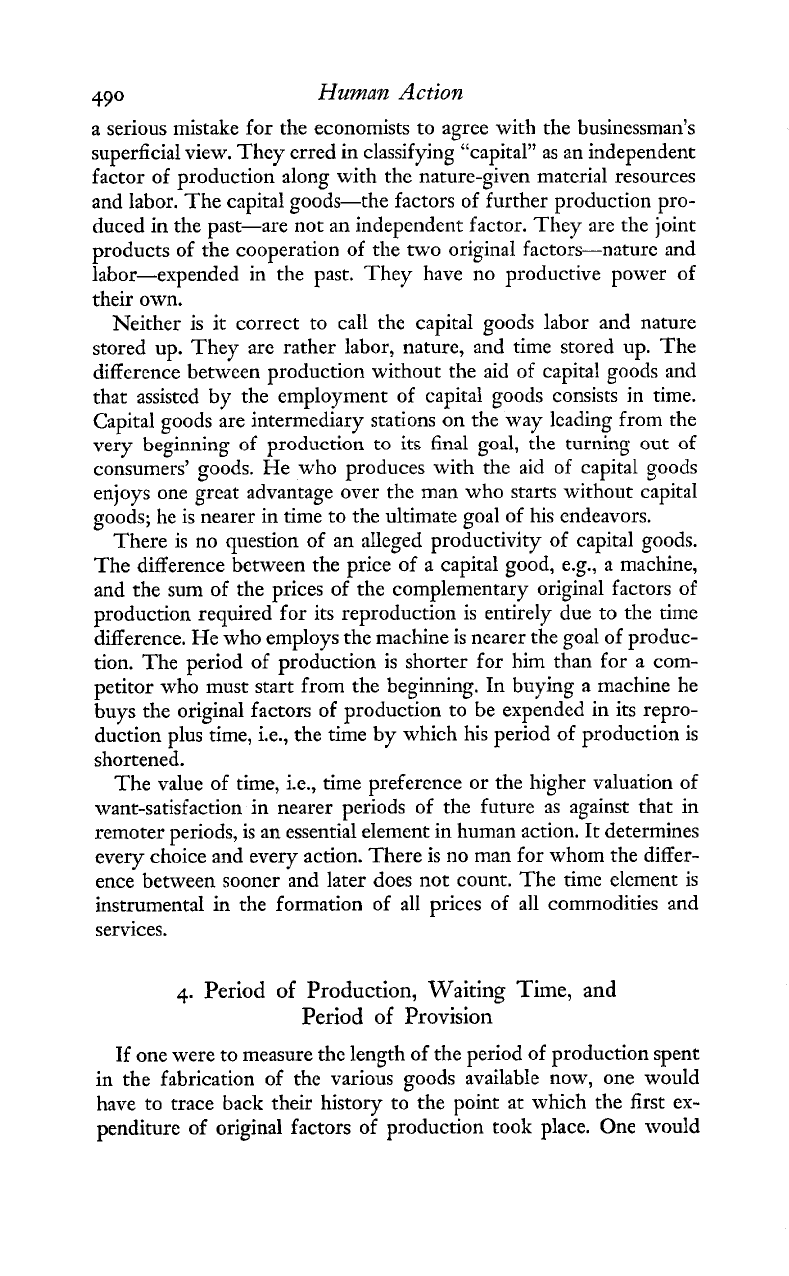
490
Human
Action
a serious mistake for the economists to agree with the businessman's
superficial view. They erred in classifying "capital" as an independent
factor of production along with the nature-given material resources
and labor. The capital goods-the factors of further production pro-
duced in the past-are not an independent factor. They are the joint
products of the cooperation of the two original factors-nature and
labor-expended in the past. They have no productive power of
their own.
Neither is it correct to call the capital goods labor and nature
stored up. They are rather labor, nature, and time stored up. The
difference between production without the aid of capital goods and
that assisted by the employment of capital goods consists in time.
Capital goods are intermediary stations on the way leading from the
very beginning of production to its final goal, the turning out of
consumers' goods. He who produces with the aid of capital goods
enjoys one great advantage over the man who starts without capital
goods; he is nearer in time to the ultimate goal of his endeavors.
There is no question of an aIleged productivity of capital goods.
The difference between the price of a capital good,
e.g.,
a machine,
and the sum of the prices of the complementary original factors of
production required for its reproduction is entirely due to the time
difference. He who employs the machine is nearer the goal of produc-
tion. The period of production is shorter for him than for
a
com-
petitor who must start from the beginning. In buying a machine he
buys the original factors of production to be expended in its repro-
duction plus time, i.e., the time by which his period of production is
shortened.
The value of time, i.e., time preference or the higher valuation of
want-satisfaction in nearer periods of the future as against that in
remoter periods, is an essential element in human action. It determines
every choice and every action. There is no man for whom the differ-
ence between sooner and later does not count. The time element is
instrumental in the formation of all prices of all commodities and
services.
4. Period of Production, Waiting
Time,
and
Period of Provision
If one were to measure the length of the period of production spent
in the fabrication of the various goods available now, one would
have to trace back their history to the point at which the first ex-
penditure of original factors of production took place. One would
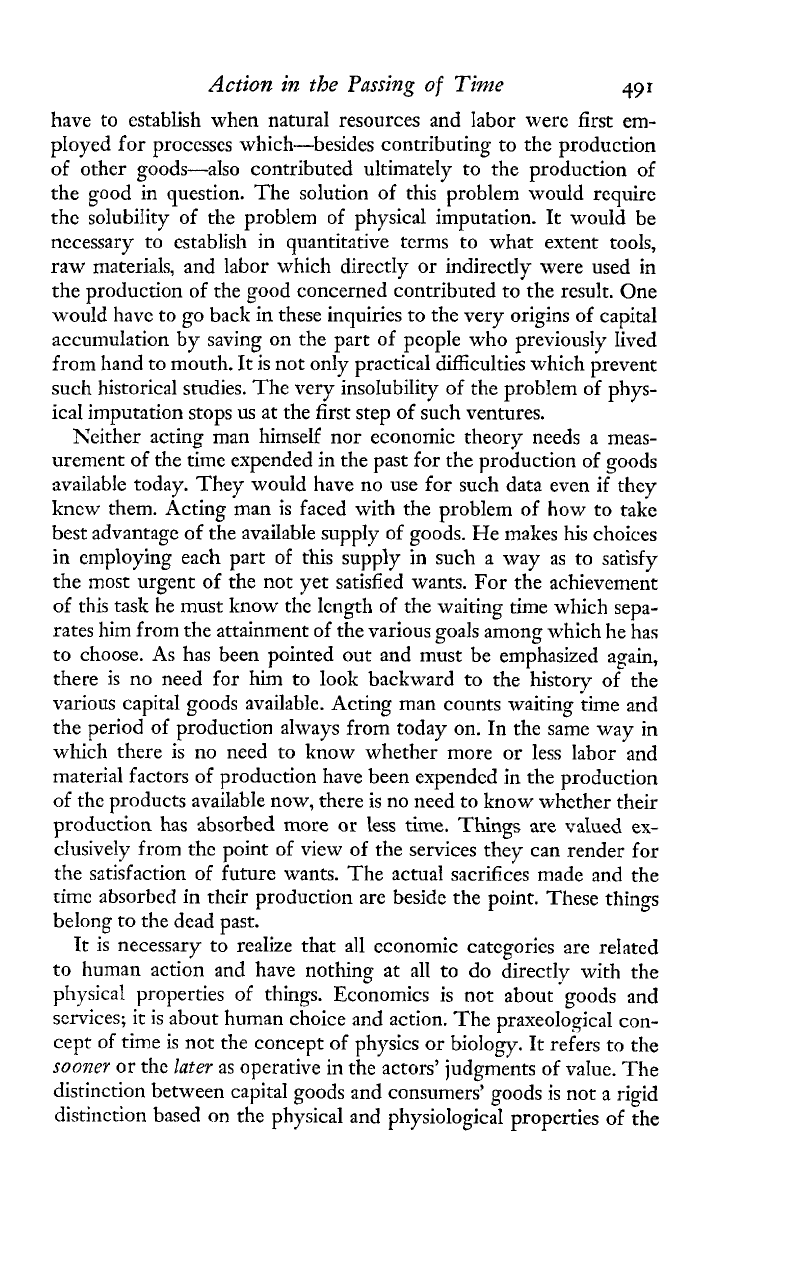
Action
in
the
Passing
of Time
497
have to establish when natural resources and labor were first em-
ployed for processes which-besides contributing to the production
of other goods-also contributed ultimately to the production of
the good in question. The solution of this problem would require
the solubiIity of the problem of physical imputation. It would be
necessary to establish in quantitative terms to what extent tools,
raw materials, and labor which directly or indirectly were used in
the production of the good concerned contributed to the result. One
would have to go back in these inquiries to the very origins of capital
accunmlation by saving on the part of people who previously lived
from band to mouth. It is not only practical difficulties which prevent
such historical studies. The very insolubility of the problem of phys-
ical imputation stops us at the first step of such ventures.
Keither acting man himself nor economic theory needs a meas-
urement of the time expended in the past for the production of goods
available today. They would have no use for such data even if they
kncw them. Acting man is faced with the problem of how to take
bcst advantage of the available supply of goods. He makes his choices
in employing each part of this supply in such a way as to satisfy
the most urgent of the not yet satisfied wants. For the achievcment
of this task he must know the length of the waiting time which sepa-
rates him from the attainment of the various goals among which he has
to choose. As has been pointed out and must be emphasized again,
there is no need for him to look backward to the history of the
various capital goods available. Acting man counts waiting time and
the period of production always from today on. In the same way in
which there is no need to know whether more or less labor and
material factors of production have been expendcd in the production
of the products available now, there is no need to know whether their
production has absorbed more
or
less time.
Things
are
valued
ex-
clusively from the point of view of the services they can render for
the satisfaction of future wants. The actual sacrifices made and the
time absorbed in their production are beside the point. These things
belong to the dead past.
It is necessary to realize that all cconomic categories are related
to human action and have nothing at a11 to do directly with the
physical properties of things. Economics is not about goods and
services;
it is about human choice and action. The praxeological con-
cept of time is not the concept of physics or biology. It refers to the
sooner
or thc
later
as operative in the actors' judgments of vaIue. The
distinction between capital goods and consumers' goods is not a rigid
distinction based
on
the physical and physiological properties of the
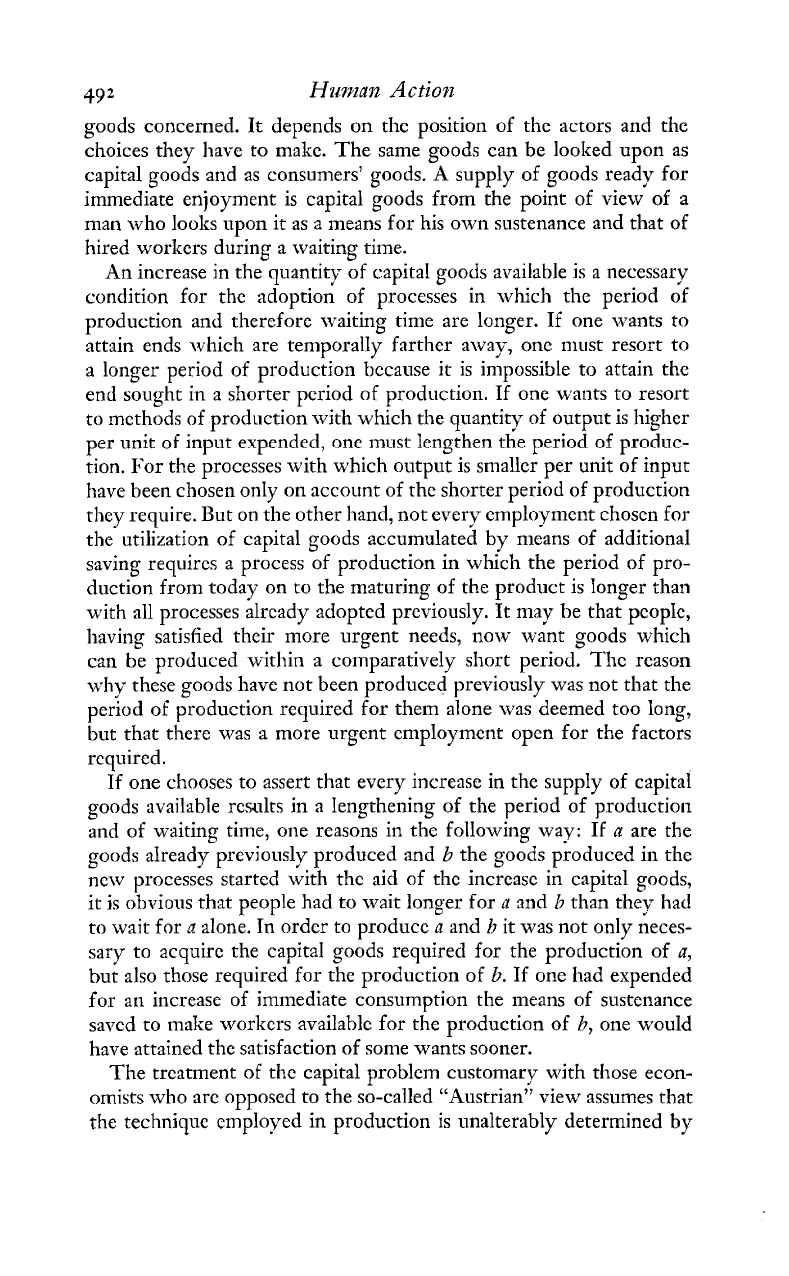
492
Human
Action
goods concerned. It depends on the position of the actors and the
choices they have to make. The same goods can be looked upon as
capital goods and as consun~ers' goods. A supply of goods ready for
immediate enjoyment is capital goods from the point of view of
a
man who looks upon it as a means for his own sustenance and that of
hired worlrcrs during a waiting time.
An increase in the quantity of capital goods available is a necessary
condition for thc adoption of processes in which the period of
production and therefore waiting time are longer. If one wants to
attain ends which are temporally farther away, one must resort to
a longer period of production bccause it is impossible to attain the
end sought in a shorter period of production. If one wants to resort
to methods of production with which the quantity of output is higher
per unit of input expended, one must lengthen the period of produc-
tion. For the processes with which output is smaller per unit of input
have been chosen only on account of the shorter period of production
they require. But on the other hand, not cvcry employment chosen for
the utilization of capital goods accumulated by means of additional
saving requires a process of production in which the period of pro-
duction from today on to the maturing of the product is longer than
with all processes already adopted previously. It may be that pcoplc,
having satisfied thcir more urgent needs, now want goods which
can be produced w-ithin
a
comparatively short period. The reason
why these goods have not been produced previously was not that the
period of production required for them alone was deemed too long,
but that there was a more urgent employment open for the factors
required.
If one chooses to assert that every increase in the supply of capital
goods available rcwlts in
a
Iengthening of the period of production
and of waiting timc, one reasons in thc following way: If
n
are the
goods already previously produced and
b
the goods p;oduced in the
new processes startcd with thc aid of the increase in capital goods,
it is obvious that people had to wait longer for
a
and
b
than they had
to wait for
a
alone. In ordcr to producc
rr
and
b
it was not only neces-
sary to acquire the capital goods required for the production of
a,
but also those required for the production of
b.
If one had expended
for an increase of immediate consumption the means of sustenance
savcd to make workcrs available for the production of
b,
one would
have attained the satisfaction of some wants sooner.
The treatment of the capital problem customary with those econ-
omists who are opposed to the so-called "Austrian" view assumes that
the technique cmployed in production is unalterably determined by
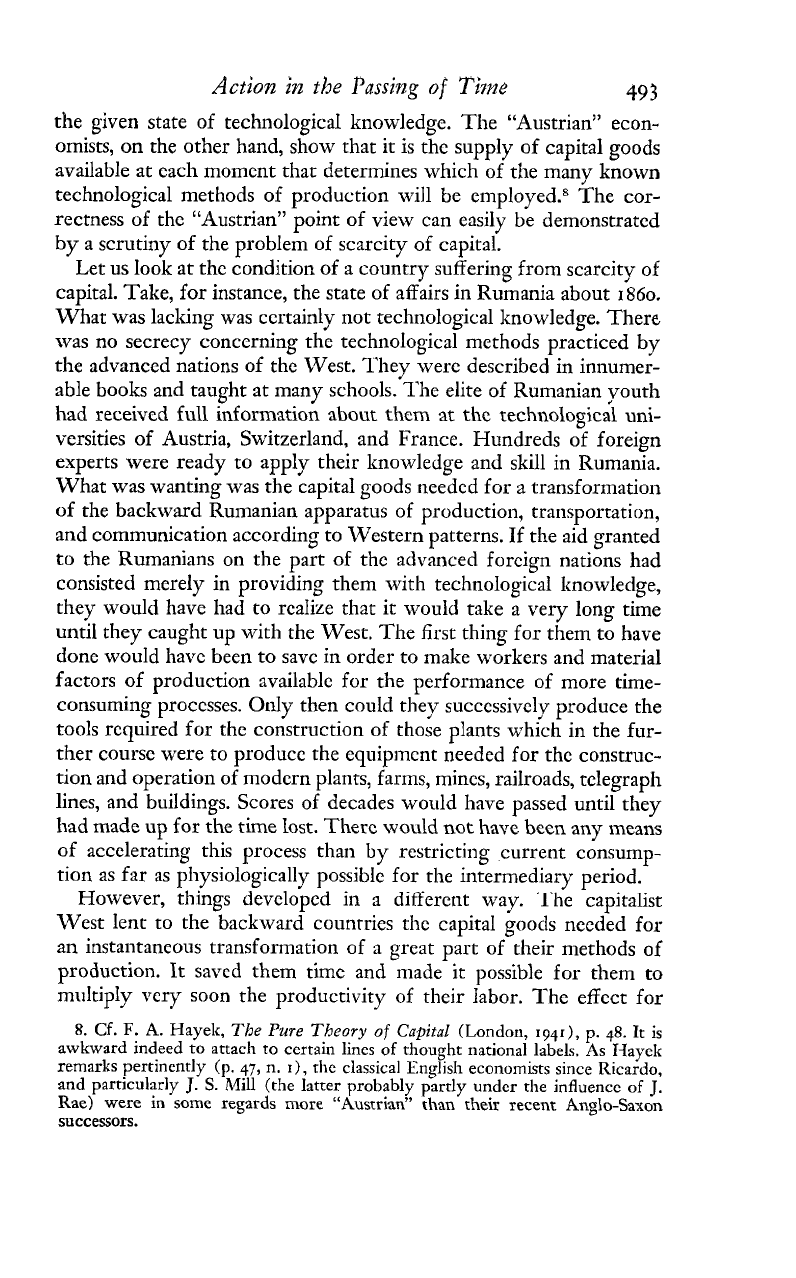
Action in
the
Passing of Time
49
3
the given state of technological knowledgc. The "Austrian" econ-
omists, on the other hand, show that it is the supply of capital goods
available at cach momcnt that determines which of the many known
technological methods of production will be empl~yed.~ The cor-
rectness of thc "Austrian" point of view can easily be demonstrated
by a scrutiny of the problem of scarcity of capital.
Let us look at thc condition of a country suffering from scarcity of
capital. Take, for instance, the state of affairs in Rumania about
I
860.
What was lacking was ccrtainly not technological knowledge. There
was no secrecy concerning the technological methods practiced by
the advanced nations of the West. l'hey were described in innumer-
able books and taught at many schools. The elite of Rumanian youth
had received
full information about thcm at the
technological
uni-
versities of Austria, Switzerland, and France. Hundreds of foreign
experts were ready to apply their knowledge and skill in Rumania.
What was wanting was the capital goods needed for
a
transformation
of the backward Rumanian apparatus of production, transportation,
and communication according to Western patterns. If the aid granted
to the Rumanians on the part of the advanced foreign nations had
consisted merely in providing them with technological knowledge,
they would have had to rcalize that it would take a very long time
until they caught up with the West. The first thing for them to have
done would haw been to savc in order to make workers and material
factors of production available for the performance of more time-
consuming proccsscs. Only then could they succcssivcly produce the
tools required for the construction of those plants which in the fur-
ther course were to produce the equipment needed for the construc-
tion and operation of modcrn plants, farms, mines, railroads,
telegraph
lines, and buildings. Scores of decades would have passed until they
had made up for the time lost. There would not have been any means
of accelerating this process than
by
restricting current consump-
tion as far as physiologically possible for the intermediary period.
However, things devclopcd in a different way. The capitalist
West lent to the backward countries the capital ioocls needed for
an instantaneous transformation of a great part of their methods of
production.
It
saved them time and made
it
possible for them to
multiply very soon the productivity of their labor. The effect for
8.
Cf.
F.
A.
Hayek,
?'be
Pure
Theory
of
Capital
(London,
~gqr),
p.
48.
It is
awkward indeed to attach to certain lines of thought national labels. As Hayck
remarks pertinently
(p.
47,
n.
I),
the classical English economists since Ricardo,
and particularly
J.
S.
Mill (the latter probably partly under the influence of
J.
Rae) were in some regards more "Austrian" than their recent Anglo-Saxon
successors.
